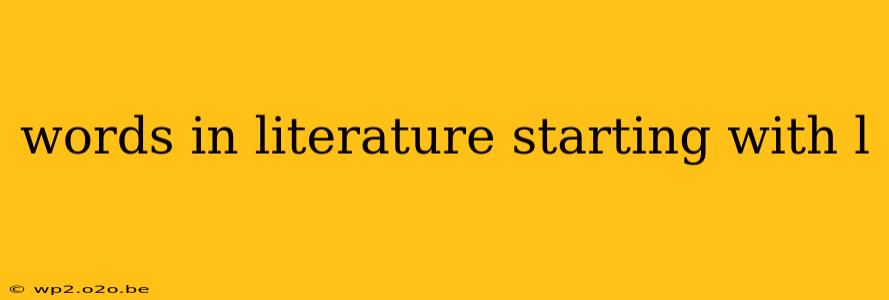The letter "L" unlocks a treasure trove of words crucial to crafting compelling narratives and evocative descriptions in literature. From lyrical descriptions to nuanced character portrayals, the words beginning with "L" contribute significantly to the richness and depth of storytelling. This exploration delves beyond simple dictionary definitions, examining the literary uses and impact of these words.
Lyrical Language & Evocative Descriptions
Many words starting with "L" lend themselves to creating lyrical prose and vivid imagery. Consider these examples:
-
Luminous: This word paints a picture of radiant light, often used to describe characters' eyes, objects, or even entire settings. Its evocative power lies in its ability to suggest not just brightness, but also a sense of inner radiance or beauty. Think of a "luminous moon" casting a magical glow on the landscape.
-
Laconic: This describes speech that is brief and to the point, often suggesting a character's stoicism or hidden depth. A laconic reply can be more impactful than a lengthy explanation, creating intrigue and mystery.
-
Languid: This word depicts a state of relaxed ease or weariness, often used to describe movement, atmosphere, or even a character's demeanor. A languid afternoon, a languid gaze—these phrases evoke a specific mood and feeling.
-
Lustrous: Similar to luminous, this word describes a shining or gleaming surface. It often suggests a sense of richness and elegance, whether applied to jewels, hair, or even fabric.
Character Development & Narrative Structure
Beyond descriptions, words beginning with "L" play a vital role in shaping characters and propelling the narrative:
-
Loquacious: This describes someone who is talkative or fluent in speech. This trait can be used to develop a character's personality, revealing aspects of their sociability, intelligence, or even nervousness. A loquacious narrator, for instance, might create a different reading experience than a silent protagonist.
-
Labyrinthine: This word, often used to describe complex or confusing structures, can be applied metaphorically to narratives or characters' inner lives. A labyrinthine plot keeps the reader guessing, while a labyrinthine mind suggests a character of great complexity.
-
Lethargic: This describes a state of sluggishness or inactivity. A lethargic character might symbolize stagnation or depression, adding depth and psychological complexity to the story.
-
Lively: In contrast to lethargic, this word denotes energy and animation, often used to describe characters, settings, or even the narrative's pace.
Beyond the Obvious: Exploring Nuance
The impact of a word extends beyond its basic definition. Consider these less frequently used but equally powerful words beginning with "L":
-
Lugubrious: This word suggests a mournful or gloomy state, far more evocative than simply saying "sad." It paints a vivid picture of sorrow, often used to describe characters, settings, or even the overall mood of a piece of writing.
-
Licentious: This term denotes excessive freedom or lack of restraint, particularly in moral or sexual matters. It carries a strong connotation and can be used to paint a character in a specific light, adding depth and complexity to their portrayal.
-
Languorous: Similar to languid, but with a stronger emphasis on sensual relaxation or indolence. This word creates a very specific mood and can be used to describe the atmosphere of a scene or the demeanor of a character.
This exploration only scratches the surface of the literary potential found within words beginning with "L." The next time you're crafting a story, remember the power of these often-overlooked words to enrich your writing and engage your readers. By paying attention to the subtle nuances and evocative potential of language, you can elevate your writing to new levels of artistry and impact.

